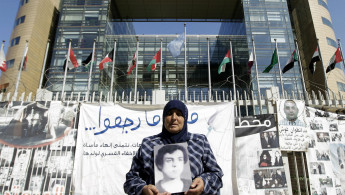The living dead of Lebanon
They came from all parts of Lebanon to learn the whereabouts of their loved-ones: children, brothers, husbands.
Over the past two decades, families have filed past government offices and UN buildings, carrying framed photographs of their relatives. These are faces which have not been seen since the Lebanese civil war of 1975-1990 tore apart the country and left thousands missing, and many more dead.
Families demand
For decades, families have asked the Lebanese government to investigate those who disappeared, but Beirut has done little to help. Many say the government does not want to reopen old wounds that could threaten the stability of this fragile country.
The Committee of the Families of the Kidnapped and Missing, set up in 1982, handed over the official investigation to the International Committee of the Red Cross this week, hoping it might achieve better results.
This followed mounting pressure from civil society groups, parliament agreed earlier this year that families of the missing had the right to access files from official inquiries.
The government had simply concluded that those missing were no longer alive - an insensitive conclusion that drew the anger of relatives.
'We are not living'
Wadad Halawani, the head of the committee into the disappeared, told al-Araby al-Jadeed that the investigation files would be seen by families over the next few months.
Halawani called on the Lebanese government to create a DNA database, saying it was "the party" with the greatest interest in closing the debate on the civil war.
"We are not living, but just waiting, and have been taking to the streets for 32 years," Halawani says.
Government failures
Fabrizio Carbone, the head of the Red Cross in Lebanon, said his organisation supported the rights of the families to learn what happened to their loved ones.
Charbel Nahas, a former labour minister, said: "Handing over the investigation is a step forward, but it is also an acknowledgement of the failure of the state.
"Citizens have not been able to rely on their government to get their rights, and are compelled to lobby international organisations. The government has neglected the issue for the past 30 years."
Sometime during the civil war, Abdul-Hadi, a Lebanese army soldier, went missing. His mother died during a hajj pilgrimage without learning his fate. The father could not bear the loss of both his wife and his son, and died of a heart attack soon afterwards.
| Niamat's determination to discover her brother's whereabouts pushed her to climb the 114 steps leading to the prime minister's office. |
Niamat, Abdul-Hadi’s brother said, "He was 42 years old when he disappeared but the search continues. All this time I have been looking for leads that could point to his whereabouts.
"I am 70 years old now and I am still looking for him. The people concerned think that hope in our hearts will be extinguished, but they don't know that our hearts burn every day."
114 steps
Niamat's determination to discover her brother's whereabouts pushed her to climb the 114 steps leading to the prime minister's office at the Grand Serail, where she wanted to demand the truth from the government.
"If the son of an official was missing, would he have done nothing and watch his wife die before his very eyes as she waited for her son's return?" she asks.
Nuzha Asaad's husband, from Tyre in southern Lebanon, was 32 when he was kidnapped during the civil war.
Since then, she says, their two youngest daughters were married without knowing about anything about their father, other than from the memories of others and few fading photographs.
"Doesn't this sum up the tragedy I have been living through?" she asks.
The missing
Earlier this year, the Red Cross completed a two-year project to collect DNA data on the disappeared, which will be vital for further investigations.
Despite the ICRC ready to initiate this crucial line of inquiry, the project is on hold as it is yet to receive the go-ahead from the government.
This is for "political reasons", according to the Carbone. "We now intend to send a straightforward letter to the ministry of interior asking for approval," he said.
Mirna al-Amin was only one when her three brothers disappeared in the war. As she grew up, her only wish in life was to be able to speak with them and get to know them.
Mirna hopes the handover of the case to the Red Cross will help her and other families in the same position, to finally achieve justice and discover the fate of their loved ones.
"My parents told me never to believe the government that declared them the missing dead," she says.
This article is an edited translation from our Arabic edition



